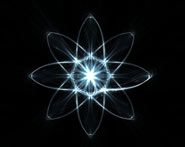


 الفيزياء الكلاسيكية
الفيزياء الكلاسيكية
 الكهربائية والمغناطيسية
الكهربائية والمغناطيسية
 علم البصريات
علم البصريات
 الفيزياء الحديثة
الفيزياء الحديثة
 النظرية النسبية
النظرية النسبية
 الفيزياء النووية
الفيزياء النووية
 فيزياء الحالة الصلبة
فيزياء الحالة الصلبة
 الليزر
الليزر
 علم الفلك
علم الفلك
 المجموعة الشمسية
المجموعة الشمسية
 الطاقة البديلة
الطاقة البديلة
 الفيزياء والعلوم الأخرى
الفيزياء والعلوم الأخرى
 مواضيع عامة في الفيزياء
مواضيع عامة في الفيزياء|
Read More
Date: 21-4-2017
Date: 17-4-2017
Date: 21-4-2017
|
Nuclear Decay
Whenever a nucleus can attain a more stable (i.e., more tightly bound) configuration by emitting radiation, a spontaneous disintegration process known as radioactive decay or nuclear decay may occur. In practice, this "radiation" may be electromagnetic radiation, particles, or both.
Detailed studies of radioactive decay and nuclear reaction processes have led to the formulation of useful conservation principles. The four principles of most interest in this module are discussed below.
Conservation of electric charge implies that charges are neither created nor destroyed. Single positive and negative charges may, however, neutralize each other. It is also possible for a neutral particle to produce one charge of each sign.
Conservation of mass number does not allow a net change in the number of nucleons. However, the conversion of a proton to a neutron and vice versa is allowed.
Conservation of mass and energy implies that the total of the kinetic energy and the energy equivalent of the mass in a system must be conserved in all decays and reactions. Mass can be converted to energy and energy can be converted to mass, but the sum of mass and energy must be constant.
Conservation of momentum is responsible for the distribution of the available kinetic energy among product nuclei, particles, and/or radiation. The total amount is the same before and after the reaction even though it may be distributed differently among entirely different nuclides and/or particles.



|
|
|
|
دخلت غرفة فنسيت ماذا تريد من داخلها.. خبير يفسر الحالة
|
|
|
|
|
|
|
ثورة طبية.. ابتكار أصغر جهاز لتنظيم ضربات القلب في العالم
|
|
|
|
|
|
|
العتبة العباسية المقدسة تستعد لإطلاق الحفل المركزي لتخرج طلبة الجامعات العراقية
|
|
|